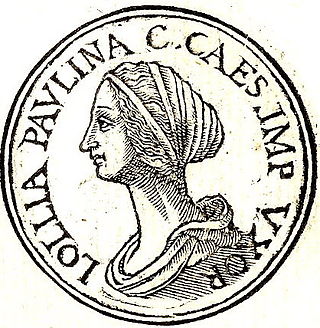Related Research Articles
This article concerns the period 69 BC – 60 BC.
This article concerns the period 79 BC – 70 BC.

The gens Atilia, sometimes written Atillia, was a plebeian family at ancient Rome, which rose to prominence at the beginning of the fourth century BC. The first member of this gens to attain the consulship was Marcus Atilius Regulus, in 335 BC. The Atilii continued to hold the highest offices of the state throughout the history of the Republic, and well into imperial times.
Marcus Aemilius Lepidus was a Roman statesman and general. After the death of Lucius Cornelius Sulla, he joined or instigated a rebellion against the government established by Lucius Cornelius Sulla, demanding a consecutive term as consul late in his year and – when refused – marching on Rome. Lepidus' forces were defeated in a battle near the Milvian Bridge and he fled to Sardinia. He was the father of the triumvir Lepidus and of one of the consuls for 50 BC, the other was Lucius Aemilius Lepidus Paullus.

Manius Aquillius was a Roman politician and general during the late Roman Republic. He was a member of the ancient Roman gens Aquillia, probably a son of Manius Aquillius, consul in 129 BC. Aquillius served as Consul of Rome with Gaius Marius in 101 BC. Before his consulship, during the Cimbrian War, he had served as a legate under Marius in Gaul. He played a pivotal role during the Battle of Aquae Sextiae where he surprised the Teutones by attacking them from behind. As consul he crushed a slave revolt in Sicily. At the start of the First Mithridatic War he was defeated and captured by Mithridates VI of Pontus who had him executed by pouring molten gold down his throat.
The Battle of Lemnos was fought on the island of Lemnos in 73 BC between a Roman fleet and a Mithridatic fleet; it was a decisive event during the Third Mithridatic War. The primary chroniclers of the battle are Appian, Cicero and Memnon, but there remain debates about the specifics in these different accounts.
The gens Popillia, sometimes written Popilia, was a plebeian family in Rome. The first of the Popillii to obtain the consulship was Marcus Popillius Laenas in 359 BC, only eight years after the lex Licinia Sextia opened that magistracy to the plebeians.

Gaius Porcius Cato was a Roman politician and general, notably consul in 114 BC. He was the son of Marcus Porcius Cato Licinianus and grandson of Cato the Censor.
Marcus Terentius Varro Lucullus, younger brother of the more famous Lucius Licinius Lucullus, was a supporter of Lucius Cornelius Sulla and consul of ancient Rome in 73 BC. As proconsul of Macedonia in 72 BC, he defeated the Bessi in Thrace and advanced to the Danube and the west coast of the Black Sea. In addition, he was marginally involved in the Third Servile War.
The gens Terentia was a plebeian family at ancient Rome. Dionysius mentions a Gaius Terentius Arsa, tribune of the plebs in 462 BC, but Livy calls him Terentilius, and from inscriptions this would seem to be a separate gens. No other Terentii appear in history until the time of the Second Punic War. Gaius Terentius Varro, one of the Roman commanders at the Battle of Cannae in 216 BC, was the first to hold the consulship. Members of this family are found as late as the third century AD.

The gens Minucia was an ancient Roman family, which flourished from the earliest days of the Republic until imperial times. The gens was apparently of patrician origin, but was better known by its plebeian branches. The first of the Minucii to hold the consulship was Marcus Minucius Augurinus, elected consul in 497 BC.
Gaius Appuleius Decianus was tribune of the plebs in 98 BC, known primarily for his connection to politically motivated prosecutions in the Late Roman Republic.

The gens Lollia was a plebeian family at Rome. Members of the gens do not appear at Rome until the last century of the Republic. The first of the family to obtain the consulship was Marcus Lollius, in 21 BC.
Marcus Marius was a quaestor of the Roman Republic in 76 BC and proquaestor under Quintus Sertorius's government in exile in Spain. Marius was sent by Sertorius to Mithradates of Pontus as an advisor and military commander in the Third Mithridatic War. He is named as or more likely confused with a Varius in Appian.
The gens Cominia was a minor plebeian family at ancient Rome, which appears in history from the Republic to imperial times. The first of this gens to hold the consulship was Postumus Cominius Auruncus in 501 BC, and from this some scholars have inferred that the Cominii were originally patrician; but all of the later Cominii known to history were plebeians.
Decimus Junius Brutus was a Roman politician who was elected consul in 77 BC.
The gens Fannia was a plebeian family at ancient Rome, which first appears in history during the second century BC. The first member of this gens to attain the consulship was Gaius Fannius Strabo, in 161 BC.

The Catilinarian conspiracy was an attempted coup d'état by Lucius Sergius Catilina (Catiline) to overthrow the Roman consuls of 63 BC – Marcus Tullius Cicero and Gaius Antonius Hybrida – and forcibly assume control of the state in their stead.
The gens Magia was a plebeian family at ancient Rome. Members of this gens are first mentioned at the time of the Second Punic War. Although several of them performed useful service to the Roman state, none of the Magii ever held the consulship.
The gens Oppia was an ancient Roman family, known from the first century of the Republic down to imperial times. The gens may originally have been patrician, as they supplied priestesses to the College of Vestals at a very early date, but all of the Oppii known to history were plebeians. None of them obtained the consulship until imperial times.
References
- ↑ Erich S. Gruen, The Last Generation of the Roman Republic (University of California Press, 1974, 1995), p. 525 online, noting that "one can do no more than guess" at the date.
- ↑ Michael C. Alexander, Trials in the Late Roman Republic, 149 BC to 50 BC (University of Toronto Press, 1990), p. 176.
- ↑ Appian, Mithridatic Wars 90.
- ↑ Gordon P. Kelly, A History of Exile in the Roman Republic (Cambridge University Press, 2006), p. 188.
- ↑ George Long, Decline of the Roman Republic (London, 1869), vol. 3, p. 100.
- ↑ Kelly, History of Exile, p. 188.
- ↑ Cicero, Pro Cluentio 97 and 103, In Verrem 39.
- ↑ Gruen, Last Generation, p. 525.
- ↑ Cicero, 1 In Verrem 39, 2 In Verrem 2.79, Pro Cluentio 71. 72, 75, 97; Alexander, Trials, p. 80.
- ↑ "There are relatively few recorded instances of death sentences actually being carried out against Roman citizens during the Republican period," notes Kelly, History of Exile, p. 1 online.
- ↑ Ronald Syme, "Rome and the Balkans, 80 BC–AD 14," in The Provincial at Rome (University of Exeter Press, 1999), p. 168 online.
- ↑ For further discussion of Sertorians at the Pontic court, see Marcus Marius (quaestor 76 BC).
- ↑ As its author himself acknowledges; see Kelly, History of Exile, p. 188.
- ↑ Syme, Rome and the Balkans, p. 168.